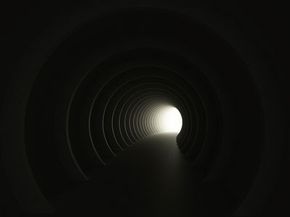It's dark, and you're trapped. Stooped down in these close quarters, you find that you can't fully stand up. You stretch a shaky hand downward, feeling blindly for the ground. Your hand finds its mark, and you lower yourself uncertainly down onto your hands and knees. You begin to crawl forward toward a bit of light you, hoping you're moving in the direction that'll get you out of here.
Were you to find yourself in a dark, confined space like this, how do you think you'd react? Fear, certainly, seems like an appropriate response. Would your pulse speed up? Maybe you'd start breathing more heavily? Sweating and trembling sound like pretty normal reactions, too. But what if you sweated, hyperventilated and were overcome with a deep feeling of dread when you were just sitting in a car?
Advertisement
It's at this point that a person would likely be diagnosed with claustrophobia -- an irrational fear of confined spaces. Claustrophobia, like all phobias, is classified by the medical establishment as an anxiety disorder. When a person suffering from claustrophobia finds himself or herself in a small space -- say, an elevator or a crowded party -- his or her phobia will be triggered. The anxiety that ensues generates both a physical and psychological reaction to the experience [source: Mount Sinai]. That explains the trembling and increased heart rate as well as the sense of panic or doom that set in while you were stuck in a car during rush hour.
Science hasn't found any preventive cure for claustrophobia, although episodes can be treated with therapy and prescription medications like antidepressants. While most of us won't suffer an attack if we climb into a cardboard refrigerator box, it seems that everyone can display symptoms of claustrophobia under extreme circumstances. After all, who wouldn't completely freak out if buried alive in a casket or restrained in a straitjacket?
So does this mean that everyone has claustrophobia -- at least to some degree? Find out on the next page about a theory that suggests claustrophobia may be latent in us all.
Advertisement
